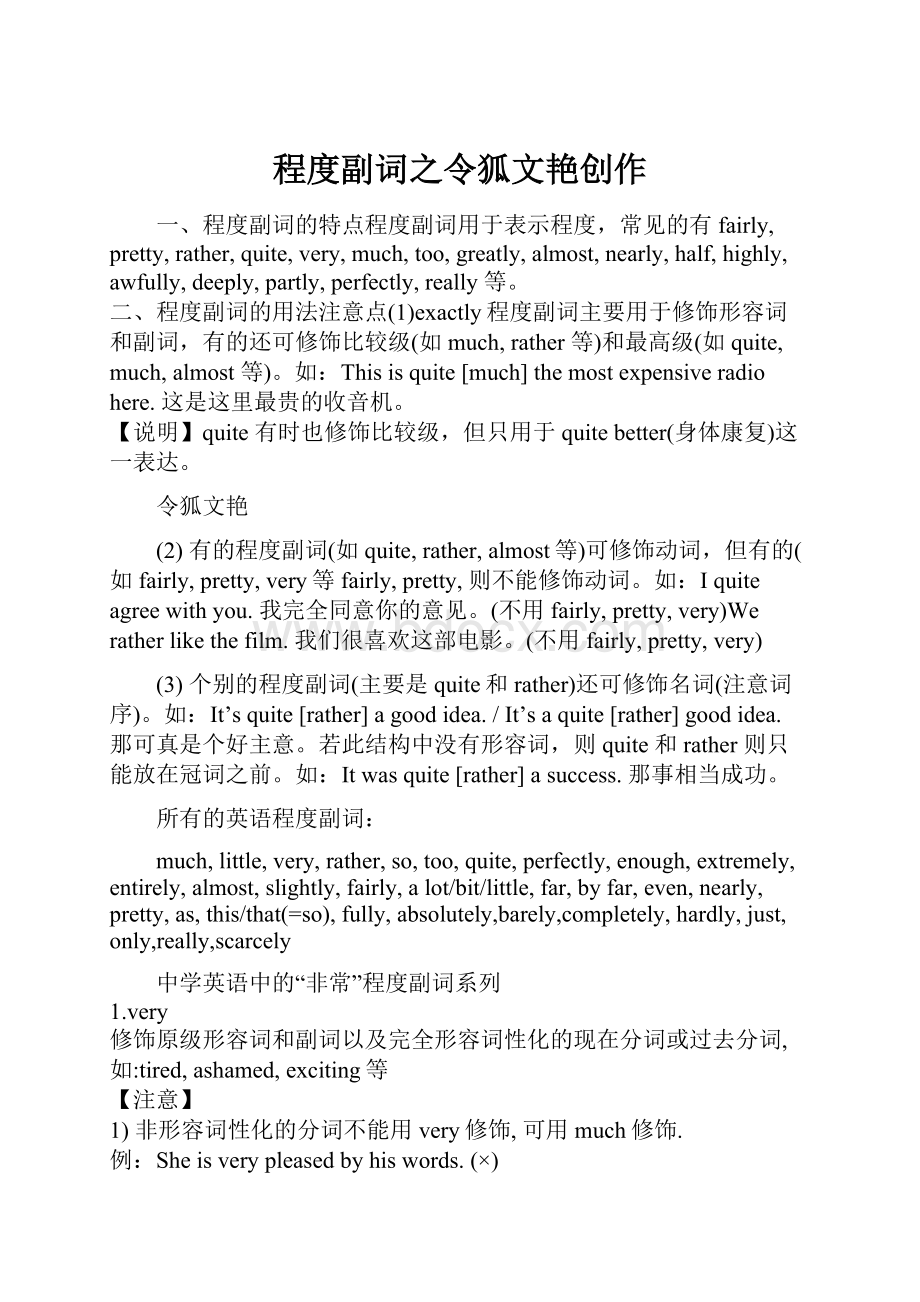程度副词之令狐文艳创作.docx
《程度副词之令狐文艳创作.docx》由会员分享,可在线阅读,更多相关《程度副词之令狐文艳创作.docx(6页珍藏版)》请在冰豆网上搜索。

程度副词之令狐文艳创作
一、程度副词的特点程度副词用于表示程度,常见的有fairly,pretty,rather,quite,very,much,too,greatly,almost,nearly,half,highly,awfully,deeply,partly,perfectly,really等。
二、程度副词的用法注意点
(1)exactly程度副词主要用于修饰形容词和副词,有的还可修饰比较级(如much,rather等)和最高级(如quite,much,almost等)。
如:
Thisisquite[much]themostexpensiveradiohere.这是这里最贵的收音机。
【说明】quite有时也修饰比较级,但只用于quitebetter(身体康复)这一表达。
令狐文艳
(2)有的程度副词(如quite,rather,almost等)可修饰动词,但有的(如fairly,pretty,very等fairly,pretty,则不能修饰动词。
如:
Iquiteagreewithyou.我完全同意你的意见。
(不用fairly,pretty,very)Weratherlikethefilm.我们很喜欢这部电影。
(不用fairly,pretty,very)
(3)个别的程度副词(主要是quite和rather)还可修饰名词(注意词序)。
如:
It’squite[rather]agoodidea./It’saquite[rather]goodidea.那可真是个好主意。
若此结构中没有形容词,则quite和rather则只能放在冠词之前。
如:
Itwasquite[rather]asuccess.那事相当成功。
所有的英语程度副词:
much,little,very,rather,so,too,quite,perfectly,enough,extremely,entirely,almost,slightly,fairly,alot/bit/little,far,byfar,even,nearly,pretty,as,this/that(=so),fully,absolutely,barely,completely,hardly,just,only,really,scarcely
中学英语中的“非常”程度副词系列
1.very
修饰原级形容词和副词以及完全形容词性化的现在分词或过去分词,如:
tired, ashamed, exciting等
【注意】
1) 非形容词性化的分词不能用very修饰, 可用much修饰.
例:
She is very pleased by his words. (×)
She is much pleased by his words. (√)
2) 一些不分等级的形容词不能用very修饰, 可用quite (completely) 修饰.
例:
You are very wrong. (×)
You are quite wrong. (√)
3) 部分以a 开头的形容词不能用very修饰, 可用 much修饰.
例:
She was very afraid of dogs. (×)
She was much afraid of dogs. (√)
2. much
1) 修饰动词;
2) 修饰介词以及形容词和副词的比较级;
例:
a) The girl is much like her mother. 这女孩非常像她妈妈。
b) She is much younger than her husband. 她比她丈夫年轻多了。
3) 修饰部分以a开头的形容词, 如:
afraid, awake, alive, ashamed, alone, etc。
3. well 作“很,非常,相当”讲, 主要用来修饰动词、介词短语或用于固定搭配。
例:
a) She was well past thirty at that time. 她那时刚好过了30岁。
b) His house is over there, well above the other houses. 他的房子在那边,就在其他房子的上方。
c) I don’t know him well. 我不是特别了解他。
d) The book is well worth reading. 这本书非常值得读。
4. quite
1) 修饰表示绝对意义的形容词或副词, 如:
sure, certain, possible, impossible, right, wrong, perfect, dead, ready等。
例:
I’m quite sure the dog is quite dead. 我非常确信狗确实是死了。
2) 修饰动词或名词。
例:
a) She quite likes the bike, but she is not quite ready to buy it. 她非常喜欢自行车,但是她不是特别想买它。
b) I had quite a time at your party that evening. 那晚我在你的聚会上呆了相当长的时间。
3) 可修饰good, well, ld, young等个别形容词的比较级。
例:
a) She’s feeling quite better today. 她今天感觉好多了。
b) She looks quite older than before. 她看上去比以前老多了。
5.badly
表示程度时含有迫切之意,常修饰want, need等动词或表示不良情况的短语
例:
a) They are badly in need of teachers. 他们急需老师。
b) She wants to go abroad badly. 她非常想出国。
c) He was badly wounded. 他受伤很重。
6. enough
意为 “足够地、非常、很”, 修饰形容词, 副词, 动词, 但须放在这些词的后面.
例:
a) The meat is not done enough. 肉不是十分熟。
b) The boy ran fast enough to catch up with the dog. 那男孩跑得非常快,能够跟上那只狗。
7. fast/sound/wide/widely
这些词用作程度副词, 主要用在一些固定搭配中。
例:
a) The baby was fast (sound) asleep. 那孩子很快就睡着了/睡得很香。
b) She was wide awake at that time. 她在那时非常清醒。
c) These books are widely different. 这些书非常与众不同。
d) Opinions vary widely on this subject. 就这一主题各方观点差异很大。
8. nice (good, fine) and +形容词(副词)
例:
a) He was good and tired after work. 他工作后非常累。
b) The flowers look good and beautiful. 花非常漂亮。
副词是一种用来修饰动词,形容词,副词或全句的词,说明时间,地点,程度,方式等概念。
副词的分类:
1)时间和频度副词:
now,then,often,always,usually,early,today,lately,next,last,already,generally,frequently,seldom,ever,never,yet,soon,too,immediately,hardly,finally,shortly,before,ago,sometimes,yesterday.
2)地点副词:
here,there,everywhere,anywhere,in,out,inside,outside,above,below,down,back,forward,home,upstairs,downstairs,across,along,round,around,near,off,past,up,away,on.
3)方式副词:
carefully,properly,anxiously,suddenly,normally,fast,well,calmly,politely,proudly,softly,warmly
4)程度副词:
much,little,very,rather,so,too,still,quite,perfectly,enough,extremely,entirely,almost,slightly.
5)疑问副词:
how,when,where,why.
6)关系副词:
when,where,why.
7)连接副词:
how,when,where,why,whether
英语“-ly”副词与其同源副词的用法比较:
英语中有一些表示方式、程度的副词具有两种形式。
如late,lately;high,highly;slow,showly等等。
在这些词当中,两种不同形式所表达的含义有的完全不同,有的很相似,而有的却完全一致。
英语中有一些表示方式、程度的副词具有两种形式。
如late,lately;high,highly;slow,showly等等。
在这些词当中,两种不同形式所表达的含义有的完全不同,有的很相似,而有的却完全一致。
这就给人们使用这些词时带来一定的麻烦。
特别是在学生中间,总免不了使用时的混淆。
笔者想就此问题分类作一点探讨。
(一)本类词有hard,hardly;late,lately;most,mostly等等,这两种副词形式含义完全不同,所以,使用时不易引起混淆。
1.Heworkshardallday.他整天都在使劲地干活。
Hehardlyworksatall.他很少干活。
2.Youhavecometoolate.你来得太晚了。
Haveyouseehimlately?
你最近见到过他吗?
3.Thepersonwhotalksmostisoftentheonewhodoesleast.说得最多的人常常干得最少。
Theaudienceconsistedmostlyofwomen.观众大部分是女的。
4.ThenextflightdosenotgodirecttoTokyo;itgoesbywayofShanghai.下趟航班不直飞东京,而是绕道上海。
Hewillbeheredirectly.他马上就来。
5.Theriderpulledhishorseupshort.骑手突然一下把马勒住。
Makearightturnshortlybeyondthevillage.村前不远处往右拐。
6.Pleasestandclearofthegate.请不要站在门前。
Hestatedhisview-pointclealy.他很清楚明白地阐述了自己的观点。
7.Theexamwasprettydifficult.这次考试相当难。
Herlittlegirlsarealwaysprettilydressed.她的小女孩穿着总是很漂亮。
(二)这类词主要有wide,widely;close,closely;high,highly等等,这两种副词形式不同,含义也有差别,但是没有第一类的区别明显,而且翻译成汉语时用词也很接近。
所以使用时很容易混淆。
这类词含义及用法上的主要特点是:
不带-ly的副词表示具体的行为和动作,说明的动作或状况有可测量性和可见性;而以-ly结尾的同源副词所表达的常常是抽象性的行为和状况。
这时,这些词大都具有“greatly”和“extremely”的含义。
试作如下比较:
1.Doyouseethatbutterflyflyinghighabovethestreet?
你是否看见那只蝴蝶在街道上方高高飞舞着?
Thedistinguishedguestswerehighlypraised.贵宾们受到了高度赞扬。
2.Heflungthedoorwideopen.他猛地把门开得大大的。
Wewerewidelydifferentonmanyquestions.我们在许多问题上分歧很大。
3.Youwillhavetopaydearforthattelescope.买那个望远镜你得付很高的价钱。
Youwillpaydearlyfortheinsult.对这样的侮辱你将付出高昂的代价。
4.Shestoodcloseagainstthewall.她紧挨着墙站着。
Thepolicewerewatchinghimclosely.警察在密切监视他。
5.Thebirdisnowflyingquitelow.鸟儿现在飞得非常低。
Hebowedlowlybeforethequeen.他谦恭地给女王鞠了一躬。
6.Theyhadtodigdeeptoreachwater.他们挖得很深才挖到水。
Youhaveoffendedhimdeeply.你冒犯他可不轻。
7.GraceisholdingtighttoPaul.格雷斯紧紧地搂抱着保罗。
Thepassengerswerepackedtightlyinthetrain.火车车箱里挤满了乘客。
8.Mr.Coletendstospeakratherloud.科尔先生说话声音总是很大。
Mr.Coleboastedloudlyofhispower.科尔先生大肆夸耀自己的权力。
急剧地, 突然地 sharply, steeply, dramatically, drastically, suddenly
显著地, 快速地 considerably, significantly, noticeably, remarkably, rapidly
稳步地, 逐渐地 steadily, moderately, gradually, smoothly,
轻微地, 缓慢地 slightly, slowly, mildly, moderately